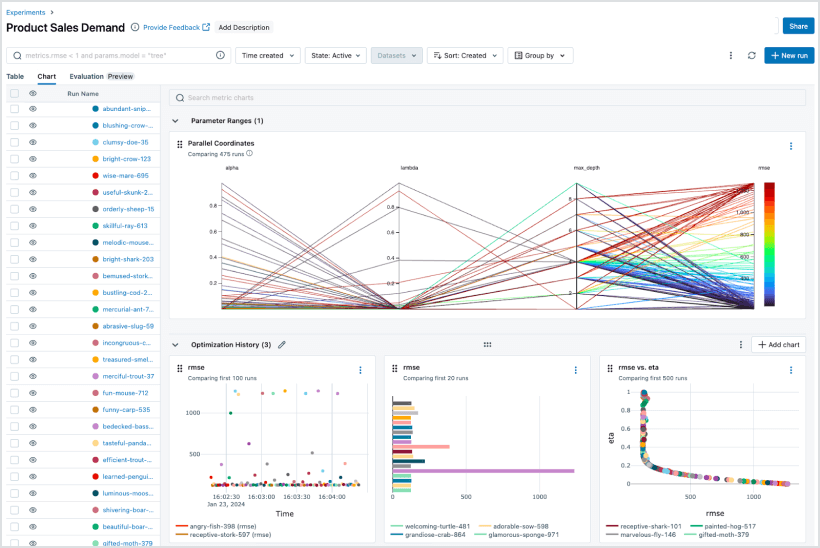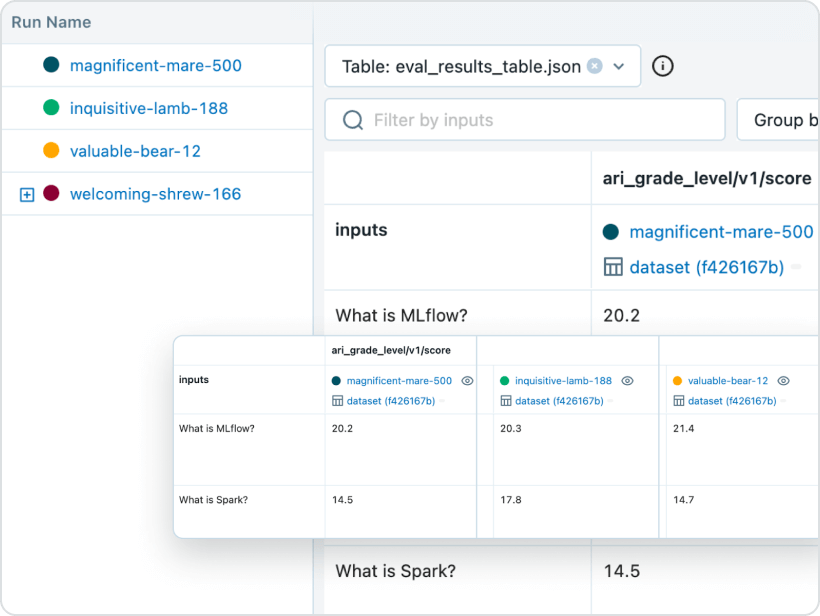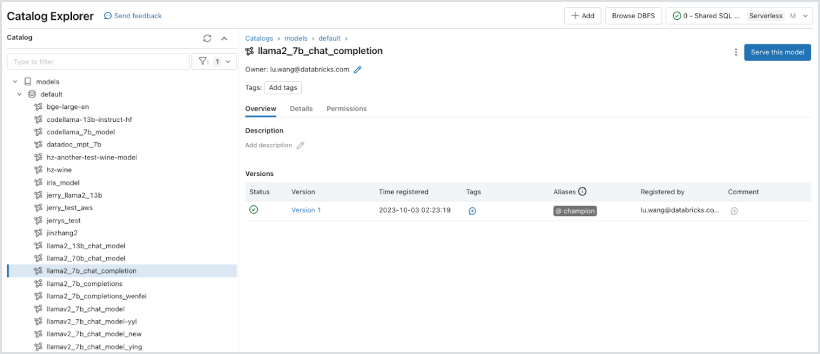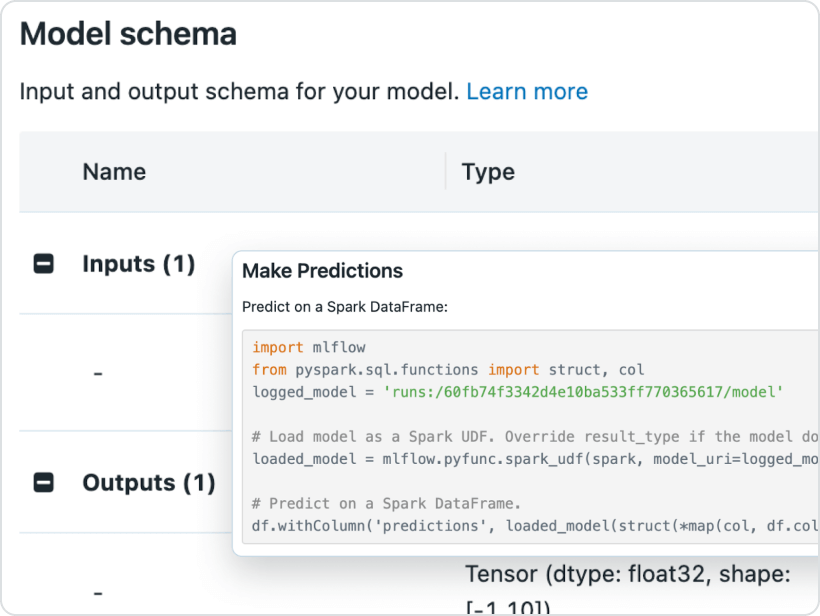관리형 MLFlow란?
Managed MLflow는 보다 효과적인 모델과 생성형 AI 앱을 구축하기 위해 Databricks에서 개발한 오픈 소스 플랫폼인 MLflow의 기능을 확장하므로 엔터프라이즈 안정성, 보안 및 확장성에 중점을 둘 수 있습니다. MLflow에 대한 최신 업데이트에는 대규모 언어 모델(LLM)의 관리 및 배포 기능을 강화하는 혁신적인 GenAI 및 LLMOps 기능이 포함되어 있습니다. 이 확장된 LLM 지원은 MLflow 배포 서버뿐만 아니라 OpenAI, Hugging Face Transformers와 같은 산업 표준 LLM 도구와의 새로운 통합을 통해 제공됩니다. 또한 MLflow와 LLM 프레임워크(예: LangChain)의 통합을 통해 챗봇, 문서 요약, 텍스트 분류, 감정 분석 등을 포함한 다양한 사용 사례에 대한 생성형 AI 애플리케이션을 구축하기 위한 단순화된 모델 개발이 가능합니다.
장점

모델 개발
프로덕션 지원 모델을 개발하기 위한 표준화된 프레임워크를 기반으로 머신 러닝 수명 주기 관리를 강화하고 가속화합니다. Managed MLflow 사용법인 레시피를 활용하면 원활한 ML 프로젝트 부트스트랩, 빠른 반복, 대규모 모델 배포가 가능합니다. 챗봇, 문서 요약, 감정 분석, 분류 등의 애플리케이션을 손쉽게 제작할 수 있습니다. LangChain, Hugging Face, OpenAI와 원활하게 통합되는 MLflow의 LLM 오퍼링을 사용하여 생성형 AI 앱(예: 챗봇, 문서 요약)을 손쉽게 개발할 수 있습니다.

Experiment 추적
모든 ML 라이브러리, 프레임워크 또는 언어로 실험을 실행하고 각 실험의 매개변수, 지표, 코드 및 모델을 자동으로 추적합니다. Databricks에서 MLflow를 사용하면 Databricks 워크스페이스 및 노트북과의 기본 통합 덕분에 해당 아티팩트 및 코드 버전과 함께 실험 결과를 안전하게 공유, 관리, 비교할 수 있습니다. 또한 MLflow 평가 기능을 통해 GenAI 실험 결과를 평가하고 품질을 개선할 수 있습니다.

모델 관리
하나의 중앙 집중된 위치에서 ML 모델을 검색 및 공유하고, Experiment에서 온라인 테스트 및 프로덕션으로 이동하는 데 협력하고, 승인 및 거버넌스 워크플로 및 CI/CD 파이프라인과 통합하고, ML 배포 및 성능을 모니터링할 수 있습니다. MLflow 모델 레지스트리는 전문 지식의 공유를 촉진하고 빈틈없는 관리를 지원합니다.

모델 배포
Docker 컨테이너, Azure ML 또는 Amazon SageMaker와의 기본 통합을 사용하여 Apache Spark™ 또는 REST API로의 배치 추론을 위한 프로덕션 모델을 빠르게 배포합니다. Databricks 기반의 관리형 MLflow에서는 Databricks 작업 스케줄러 및 자동 관리형 클러스터를 사용하여 프로덕션 모델을 운용하고 모니터링하여 비즈니스 요구 사항에 따라 확장할 수 있습니다.
MLflow의 최신 업그레이드는 GenAI 애플리케이션을 원활하게 패키지화하여 배포할 수 있도록 지원합니다. 이제 Databricks Model Serving을 사용하여 문서 요약, 감정 분석 및 분류와 같은 챗봇 및 기타 GenAI 애플리케이션을 대규모로 배포할 수 있습니다.
Features
Features
최신 기능에 대한 자세한 내용은 Azure Databricks 및 AWS의 제품 뉴스를 참조하세요.
MLflow 제품 비교
Open Source MLflow | Managed MLflow on Databricks | |
|---|---|---|
Experiment 추적 | ||
MLflow 추적 API | ||
MLflow 추적 서버 | 자체 호스팅 | 완전 관리형 |
노트북 통합 | ||
워크플로 통합 | ||
재현 가능한 프로젝트 | ||
MLflow 프로젝트 | ||
모델 관리 | ||
Git 및 Conda 통합 | ||
프로젝트 실행을 위한 확장 가능한 클라우드/클러스터 | ||
MLflow 모델 레지스트리 | ||
모델 버전 관리 | ||
유연한 배포 | ||
ACL 기반 단계 전환 | ||
CI/CD 워크플로 통합 | ||
보안 및 관리 | ||
기본 내장 배치 추론 | ||
MLflow 모델 | ||
기본 내장 스트리밍 분석 | ||
고가용성 | ||
자동 업데이트 | ||
역할 기반 액세스 제어 | ||
보안 및 관리 | ||
역할 기반 액세스 제어 | ||
역할 기반 액세스 제어 | ||
역할 기반 액세스 제어 | ||
역할 기반 액세스 제어 | ||
보안 및 관리 | ||
역할 기반 액세스 제어 | ||
역할 기반 액세스 제어 | ||
역할 기반 액세스 제어 | ||
역할 기반 액세스 제어 | ||
보안 및 관리 | ||
역할 기반 액세스 제어 | ||
역할 기반 액세스 제어 | ||
역할 기반 액세스 제어 |
리소스
블로그
영상
튜토리얼
웨비나
웨비나
웨비나
Frequently Asked Questions
Ready to get started?
